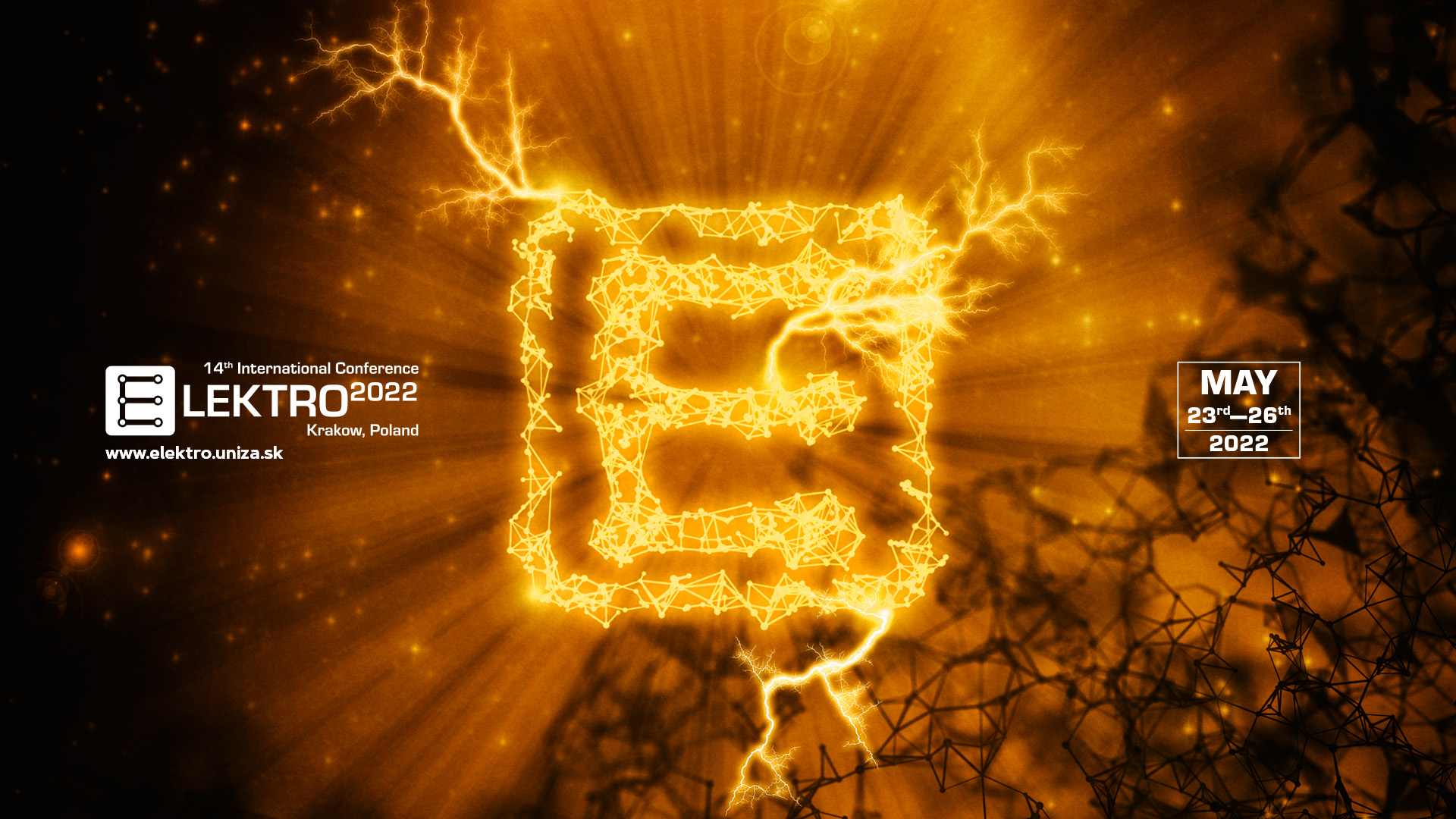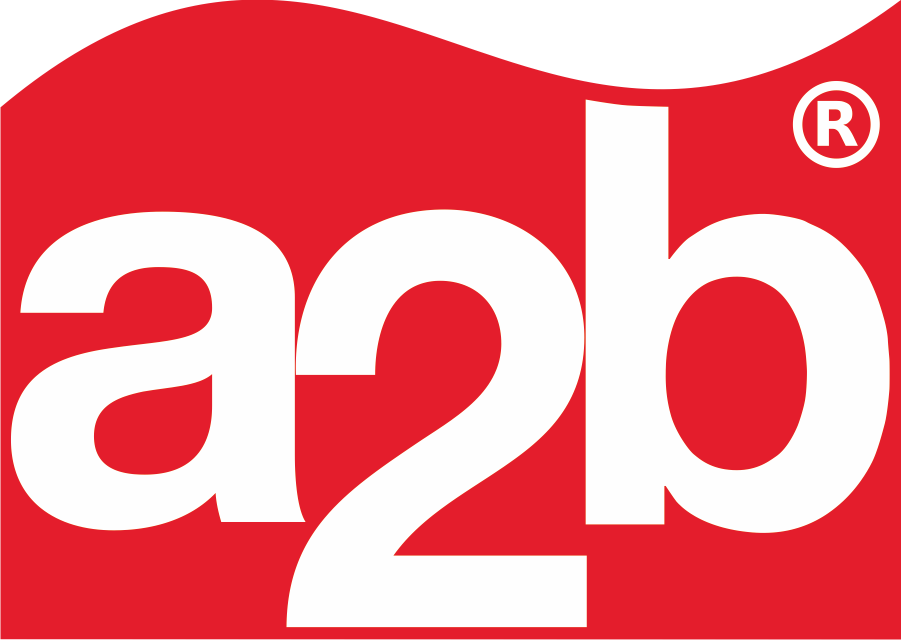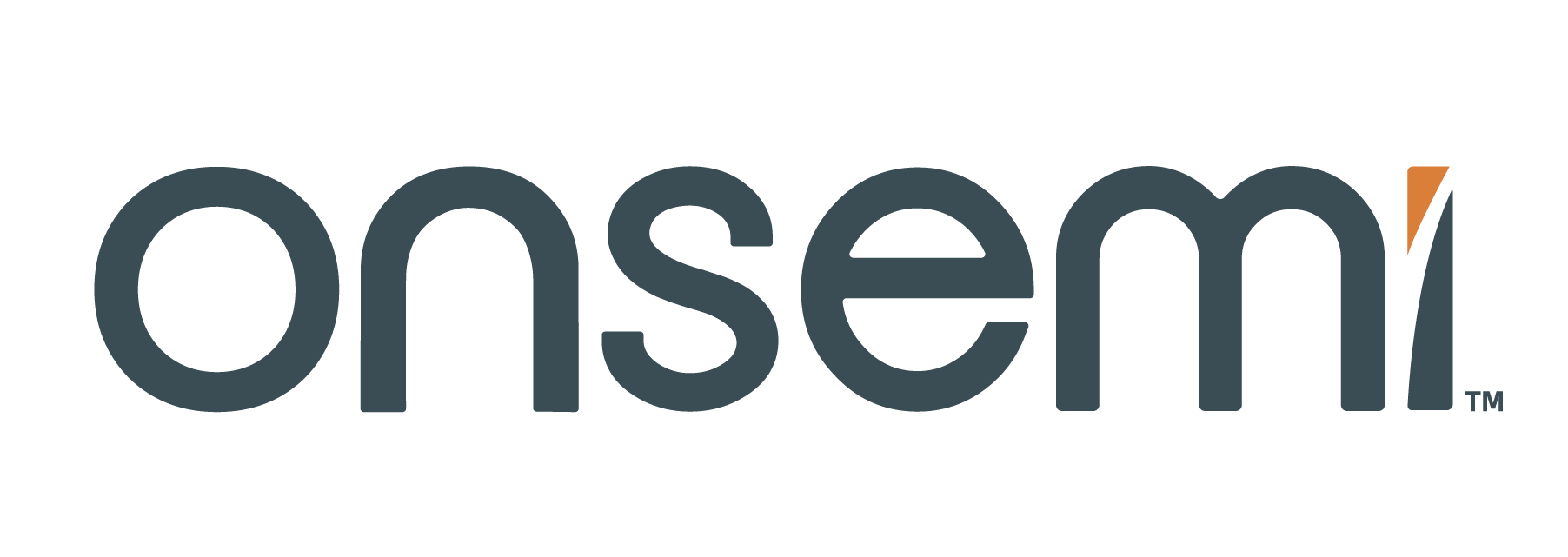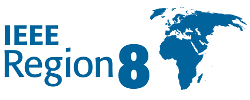About the conference
The conference is the fourteenth of the series of international conferences which began in 1995 initially as a national conference with international participation. The conference is organized by the Faculty of Electrical Engineering and Information Technology, University of Žilina, every two years.
The conference ELEKTRO 2022 is organized in cooperation with the Silesian University of Technology, PL and the University of Catania, IT.
The purpose of the conference is to provide an international forum for researchers and professionals interested in electrical and electronic engineering, information and communication technologies as well as interdisciplinary areas with the main attention to the conference topics.
Conference topics
TPC1 Informatics and Information Technologies
chair: Robert Hudec, Ivan Glesk
Wireless, Optical and Photonic Systems and Networks; Advanced Networks and Services; Modelling and Simulations in ICT; Digital Signal Processing; Multimedia Technologies; E-Society; Intelligent Transport Systems, Transport Telematics and Smart Cities; E – Safety, Risk Analysis, Theory and Methods of Safety Control; Artificial Intelligence in Process Control; Communication Systems in Transport and Industry.
TPC2 Power Electronics and Energy Systems
chair: Michal Frivaldsky, Mario Cacciato
Power Electronic Devices and Converter Topologies; Modelling, Simulation, Measurement; Control Systems, Digital Control and Microelectronics; Thermal Performance and Optimization; Power Electronic Systems and Applications; Autotronics; Automotive Applications (EV, HEV, etc.); Power Train and Communication In Vehicles; Battery Management and Energy Storage; Electrical Machines, Drives and Traction; Power Electrical Engineering, Smart Grids, Renewable Power Sources; Power Supply for Electrical Railways Applications; Electrical Measurements and Instrumentations.
TPC3 Materials (and) Technologies, Biomedical Engineering
chair: Ladislav Janousek, Dusan Pudis, Monika Kwoka
Electromagnetic Fields in Various Materials and Coupled Problems; Utilization of Electromagnetic Field Effects in Material Nondestructive Evaluation; Analysis of Electromagnetic Field and Electrical Circuits using Analytical and Numerical Methods; Technical Tools and Computer-aided Methods in Biomedical Engineering; New and Perspective Materials and their Physical Properties; New Experimental Methods, Techniques and Technologies; Thin Layers and Heterostructures; Microelectronic and Optoelectronic Devices; Optical Fibers and Cables
TPC4 Robotics, Cybernetics, Mechatronics
chair: Vojtech Simak, Ondrej Hock
Industrial and Mobile Robotics; Mobile and Compliant Manipulators; Multiagent Systems; Intelligent Vehicles; Visual Sevoing; Data processing; Control Systems; Mechatronic Systems – design, modelling, simulation and optimization; Sensors and Actuators; Automation Devices; Biologically Inspired Robotics; Collaborative Robotics; Aero-Space Applications
TPC5 Education in Electrical Engineering and ICT
chair: Peter Hockicko
Attractiveness of Engineering Education; Project and Problem Based Learning; E-learning, STEM education
Registration and Fees
| In-Person participants | Virtual participants | ||||
|---|---|---|---|---|---|
| Type of registration | Early* | Regular | Early* | Regular | |
| Authors (first and second paper**) | € 550 | € 590 | € 380 | € 410 | |
| Participants (without papers) | € 560 | € 560 | - | - | |
| Additional paper (3rd and the following) | € 270 | € 270 | € 270 | € 270 | |
| Students (PhD) | € 380 | € 450 | € 270 | € 320 | |
| IEEE members | € 490 | € 530 | € 340 | € 370 | |
| Accompanying person | € 250 | € 250 | - | - | |
| Regular registration deadline is midnight EST, 29.04.2022 | |||||
| * | The early registration deadline is midnight EST, 28.03.2022 | ||||
| ** | Registered author may submit two papers | ||||
Note: All fees in the table above are including 20% VAT. Virtual participants outside Slovakia will pay the fee excl. VAT (reverse VAT charge). Please wait for the registration confirmation e-mail with payment instructions.
The registration can be cancelled only until 29.04.2022.
The conference will be hybrid mode because of COVID-19 pandemic. You can present your paper online or physically. In case of worsening of the pandemic situation, the conference will be held only online and fee difference will be returned.
The registration fee for In-Person participants includes the attendance at all conference sessions, lunches, coffee breaks, conference dinner, documentation and social programme.
The registration fee for Virtual participants includes the documentation.The registration fee for accompanying person includes lunches, coffee breaks, conference dinner and social programme.
The conference fee payment should be done by bank transfer.
Account Number: 7000269917/8180
IBAN: SK74 8180 0000 0070 0026 9917
SWIFT: SPSRSKBA
Invoicing address:
University of Zilina
Faculty of Electrical Engineering and Information Technology
Univerzitna 1
010 26 Zilina, Slovakia
ID (IČO): 00397563
VAT (IČ DPH): SK2020677824
Bank:
Statna pokladnica
Radlinského 32
P.O.BOX 13
810 05 Bratislava 15
As a variable symbol please write the number 2305 and enter the participant's name and Paper/-s No. in the note.
Important dates
| November 30, 2021 | Deadline for uploading full papers |
| January 24, 2021 | Notification of acceptance |
| February 21, 2022 | Final papers submission |
| March 28, 2022 | Early registration deadline |
| April 29, 2022 | Regular registration deadline |
| May 23 - 26, 2022 | Conference |
Guidelines for Authors
Authors upload papers/manuscripts that first go through a review process: The length of the paper should be from 4 to 6 full pages, including the paper title, authors and affiliations, figures and references. Manuscripts must be prepared in English language in the IEEE standard two-column conference format (A4) using the template:
Template for Microsoft Word (.DOCX format)
Template for LaTeX (.ZIP format)
Please be advised that every publication submitted to the ELEKTRO 2022 conference will be checked for plagiarism. Conference organizer is obliged to reject papers which did not pass the check or papers authored or co-authored by authors on the Prohibited Author List.
The appropriate copyright clearance code notice is to appear on the bottom of the first page of each paper according to the guidelines set forth in the Cataloging/Copyright Instructions for an IEEE Conference Proceeding. Detailed instructions can be found here.
- For all papers except few special cases below, the copyright notice is:
978-1-6654-6726-1/22/$31.00 ©2022 IEEE
- For papers in which all authors are employed by the US government, the copyright notice is:
U.S. Government work not protected by U.S. copyright
- For papers in which all authors are employed by a Crown government (UK, Canada, and Australia), the copyright notice is:
978-1-6654-6726-1/22/$31.00 ©2022 Crown
- For papers in which all authors are employed by the European Union, the copyright notice is:
978-1-6654-6726-1/22/$31.00 ©2022 European Union
Final submission
When your article is in the state "Paper accepted - awaiting final files", please follow these steps in order to prepare IEEE Xplore-compliant file:
- make sure the correct copyright notice is in the footnote of the first page (see above, usually 978-1-6654-6726-1/22/$31.00 ©2022 IEEE).
- login / register to IEEE PDF eXpress site https://ieee-pdf-express.org/account/login
- use the Conference ID: 53996X
- use Dashboard -> Create new title
- follow the instructions of PDF eXpress
- when the process finishes successfuly, you should be able to download IEEE compliant .pdf file
- login to elektro.uniza.sk
- navigate to My articles -> Upload file
- upload the .pdf file received from IEEE PDF eXpress as the final version of the paper.
- click "Go to IEEE copyright submission" and follow the instructions to sign the electronic copyright.
Important: Finished articles with IEEE CrossCheck result above 50% will NOT BE indexed by IEEE Xplore.
Information on the preparation of paper presentations for the ELEKTRO 2022 conference
- All presentations will be presented via Webex system.
- The presentation should not exceed 10 minutes.
- Discussion should last 5 minutes.
- The presentation must be uploaded on the conference web page until 19th May 2022 in PDF format.
- Presenting authors are asked to respect specified times.
GUIDELINES FOR Presenters
These rules will be followed during the presentations of papers at the ELEKTRO 2022 conference:
- All presentations will be presented via Webex system.
- The presentation should not exceed 10 minutes.
- Discussion should last 5 minutes.
- The presentation must be uploaded on the conference web page until 19th May 2022 in PDF format.
- Presenting authors are asked to respect specified times.
Short instructions for connecting via the WEBEX video conferencing system
Publication - general information
Accepted papers will be submitted for inclusion into IEEE Xplore.
Since 2014 publications of the ELEKTRO conferences were indexed in the databases Web of Science, Scopus and IEEE. Also publications from the ELEKTRO 2022 conference will be requested to be evaluated and covered in the mentioned databases.
The registration fee payment is necessary to involve the paper to proceedings.
Selected and extended papers with relevant scope will be proposed for publication in impacted international scientific journals:
INVITED LECTURES

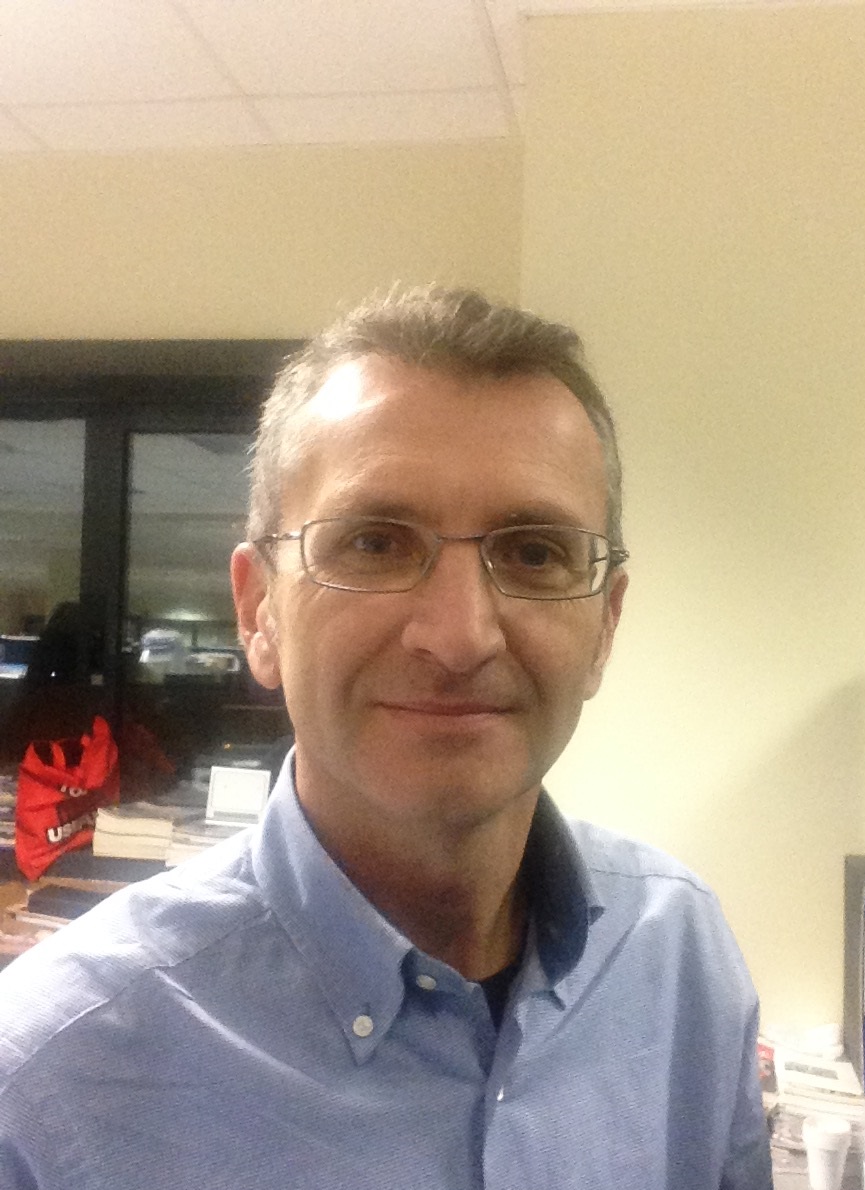
Title: Wide Band Gap Technologies for Electric Motor Drives
Prof. Giacomo Scelba
University of Catania, Italy
giacomo.scelba@unict.it
Dr. Ing. Francesco Gennaro
STMicroectronics, Italy
francesco.gennaro@st.com
Abstract: Silicon carbide (SiC) power MOSFETs and gallium nitride (GaN) FETs are becoming the go-to devices for high-power and high-efficiency electromechanical energy conversion, with switching frequencies reaching up 300 kHz for hard-switched inverters. These wide bandgap (WBG) technologies can be fully integrated to high-speed motor drives and automotive applications, in which the power converter supplies low-inductance motors requiring a high switching frequency and a high-bandwidth current regulation strategy to obtain acceptable current ripple. In the first part of the talk, a preliminary analysis on the effects of Ultra-High Switching Frequency (UHSF) PWM on the cable-motor system will be initially presented, followed by some technical solutions devoted to take full advantage of using WBG power semiconductors in Motor Drives. The second part of the talk provides an overview of the current state of the art power switches for electric drives and the roadmap for next generation devices with a special focus on the requirements for high power and high frequency operations, such as driving and package.

Title: Electricity Way for Progress in Medicine
Prof. Aleksander Sieroń M.Sc Eng.MD Dr HC multi
Medical University of Silesia in Katowice, Poland
asieron2@wp.pl
Abstract: For over 100 years the progress in medicine have been significantly demarcated by the development of knowledge on electromagnetism. Beginning from ECG, though EMG, to modern methods of imaging as MRI and CT, one can everywhere find an electric sign. Fixed in social consciousness the contribution of electricity to diagnostics is also distinctly visible in therapy. Destruction of some tissues due to ablation with the use of electric currents of various frequencies is actually recognized method of treatment, among others in cardiology and surgery. Nowadays modern applications of variable magnetic field as well as low- and high energy laser therapy bring also measurable benefit, among others in form of lowering the number of leg amputations. In my opinion the high level of knowledge in many medical disciplines would be difficult to obtain without widely understood electricity.
Title: Destructive states in the area defined as the no-damage region in the ITIC / SEMI F47 characteristics
Grzegorz Putynkowski, Krzysztof Wożny
CBRTP S.A. Research and Development Center of Technology for Industry, Warsaw, Poland
grzegorz.putynkowski@cbrtp.pl, krzysztof.wozny@cbrtp.pl
Elżbieta Szychta, Leszek Szychta
Faculty of Telecommunications, Computer Science and Electrical Engineering, Bydgoszcz University of Science and Technology, Bydgoszcz, Poland
elzbieta.szychta@utp.edu.pl, leszek.szychta@utp.edu.pl
Abstract: The spreading application of robotised systems and the technological development of converter systems that cause a number of disturbances of electric power quality give rise to the question whether their impact on the lifetime of electric receivers and their peripheries is not in excess of normative standards. The authors, in cooperation with some authorised after-sales service providers for industrial robot suppliers, have observed a rising number of after-sales complaints that remain unsolved, where the cause of robot stoppage or damage is not diagnosed. The authors believe this situation is directly caused by the fact supply voltage sags and returns to its default value are not registered (a lack of sag records) and relations are not analysed between voltage sags, current, and anomalous states of industrial robots’ automatic systems. In search for evidence of the destructive effects of voltage sags, the authors have undertaken some research and identified states destructive to electric receivers (in this case, industrial robots) in the region the ITIC / SEMI F47 curve defines as no-damage.
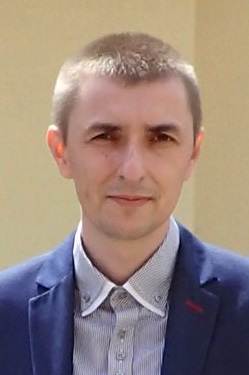
Title: Aggregation of small energy storage systems
Peter Svolik
A2B, s.r.o., Zilina, Slovakia
peter.svolik@a2b.sk
Abstract: This lecture focuses on the opportunities offered by the aggregation of small energy storage systems created by the change of operation of traditional battery based rectifier systems and their centralized control. Focusing on the existing network we are looking on additional economic benefit for the aggregator and the storage owner. One of the possibility is to use the telecom network and related BTS power systems spread over every country as a distributed energy storage system. Rethinking the way of remote monitoring changing it to complex remotely managed system offers different business models. Moreover all the appearing opportunities like renewable energy sources, second use of batteries and bidirectional converters can enrich the final solution.

Title: Advanced optical and radio communication systems to support the IT ecosystem
Milan Dado
University of Zilina, Slovakia
milan.dado@uniza.sk
Abstract: Humanity produces more than 1,000 petabytes of data each day at the present time. Approximately 90% of all the world data has been produced in just the last two years. Communication systems are the basis of almost everything that is often called IT today. In accordance with Amdahl’s law, 1 MIPS networked computing power, which is multiplied approximately twice in one year, requires 1Mbps I/O bitrate for communication. Presented will be key advanced technologies to support such requirements with optical communication networks, mobile networks through which information is transmitted, and the nanoelectronics and nanophotonic that process information. Artificial intelligence (AI) is changing the world and it’s happening faster and, in more ways than anyone ever imagined. Analyses and applications of Communication systems and networks can also be very effectively solved by the new methods of AI. The second part of the talk there will be presented practical requirements for the future development of new Optical Communication Systems and Radio Communication Systems for connecting households given in Digital compass EU 2030, which is a big challenge for all participating in systems development, creation of networks, new services, and their operation.
Venue and location
The ELEKTRO 2022 conference will take place in Krakow, Poland.
Krakow, the second largest city in Poland, is located in the central southern part of Poland, well connected with major international airports such as Frankfurt am Main, München, Rome, London and others. It is only 1.5 hours by plane from Frankfurt and London, and only six hours by car, or train, from Vienna, Austria.
Krakow is one of the most attractive tourist destinations in Europe, and is also the cultural center of the Eastern Europe. Traditionally it has been one of the leading centres of Polish academic, economic, cultural and artistic life. Its Old Town was declared the first UNESCO World Heritage Site in the world.
The conference will be held at Novotel Kraków City West – Armii Krajowej 11 - 30-150, Kraków
You may make a reservation at the hotel using this link.
Important: Special rate for paticipants of ELEKTRO 2022 conference is available until 22.04.2022 23:59.
International scientific committee
| ANDRIUKAITIS, D. | Kaunas University of Technology, Lithuania |
| BABUSIAK,B. | University of Zilina, Slovakia |
| BENOVA, M. | University of Zilina, Slovakia |
| BLAZEK, V. | RWTH Aachen, Germany |
| BORGHETTI, A. | University of Bologna, Italy |
| BORIK, S. | University of Zilina, Slovakia |
| BOUHOURS, G. | Thales Alenia Space, France |
| BRACINIK, P. | University of Zilina, Slovakia |
| BRANDSTETTER, P. | VSB - Technical University of Ostrava, Czechia |
| BRIDA, P. | University of Zilina, Slovakia |
| BUKHENSKII, K. V. | Ryazan State Radio Engineering University, Russia |
| BURY, P. | University of Zilina, Slovakia |
| CACCIATO, M. | UniCT Catania, Italy |
| CALKOVSKA, A. | Comenius University, Slovakia |
| DADO, M. | University of Zilina, Slovakia |
| DOBRUCKY, B. | University of Zilina, Slovakia |
| DRGONA, P. | University of Zilina, Slovakia |
| DUCHON, F. | Slovak University of Technology in Bratislava, Slovakia |
| FRANKO, M. | EVPU Nova Dubnica, Slovakia |
| FRIVALDSKY, M. | University of Zilina, Slovakia |
| GERADA, CH. | University of Nottingham, United Kingdom |
| GLESK, I. | University of Strathclyde, United Kingdom |
| GOLL, S. | Ryazan State Radio Engineering University, Russia |
| GROUMPOS, P. | University of Patras, Greece |
| GUSEV, S. | Ryazan State Radio Engineering University, Russia |
| GUTTEN, M. | University of Zilina, Slovakia |
| HALASOVA, E. | Comenius University, Slovakia |
| HERENCSAR, N. | Brno University of Technology, Czechia |
| HOCKICKO, P. | University of Zilina, Slovakia - publication chair, organizing chair |
| HOTRA, O. | Lublin University of Technology, Poland |
| HUDEC, R. | University of Zilina, Slovakia |
| CHEBEN, P. | National Research Council, Canada |
| CHEN, H. | China University of Mining and Technology, China |
| CHIRKIN, M. V. | Ryazan State Radio Engineering University, Russia |
| JAKUS, J. | Comenius University, Slovakia |
| JANOTA, A. | University of Zilina, Slovakia |
| JANOUSEK, L. | University of Zilina, Slovakia |
| JUHAR, J. | Technical University of Kosice, Slovakia |
| JURECKA, S. | University of Zilina, Slovakia |
| KACIK, D. | University of Zilina, Slovakia |
| KARBAN, P. | University of West Bohemia, Czechia |
| KELEMEN, M. | Technical University of Kosice, Slovakia |
| KINDL, V. | University of West Behemia, Czechia |
| KOPYLOVA, N. A. | National Research University “Moscow Power Engineering Institute” Moscow, Russia |
| KORYACHKO, A. V. | Ryazan State Radio Engineering University, Russia |
| KOTULIAK, I. | Slovak University of Technology in Bratislava, Slovakia |
| KOUDELKA, O. | Graz University of Technology, Austria |
| KRATOCHVIL, T. | Brno University of Technology, Czechia |
| KREJCAR, O. | University of Hradec Králové, Czechia |
| KUDELCIK, J. | University of Zilina, Slovakia |
| KWOKA, M. | Silesian University of Technology, Poland |
| LACKO, M. | Technical University of Kosice, Slovakia |
| LANGIE, G. | KU Leuven, Belgium |
| LUKASIK, Z. | UTH Radom, Poland |
| MAKYS, P. | University of Zilina, Slovakia |
| MARCINIAK, M. | National Institute of Telecommunications, Poland |
| MARTINCEK, I. | University of Zilina, Slovakia |
| MARTIS, C. | Technical University of Cluj-Napoca, Romania |
| MIKULSKI, J. | University of Economics in Katowice, Poland |
| MISUREC, J. | Brno University of Technology, Czechia |
| MUNOZ, F. | Institute of Ceramics and Glass, Spain |
| ORAVEC, M. | Slovak University of Technology in Bratislava, Slovakia |
| OTCENASOVA, A. | University of Zilina, Slovakia |
| PALACKY, P. | VSB - Technical University of Ostrava, Czechia |
| PENHAKER, M. | VSB - Technical University of Ostrava, Czechia |
| PEREPELKIN, D. A. | Ryazan State Radio Engineering University, Russia |
| PINTO, J. | Aveiro University, Portugal |
| PIRNIK, R. | University of Zilina, Slovakia |
| PUDIS, D. | University of Zilina, Slovakia |
| PYRHONEN, J. | LUT Lappeenranta, Finland |
| QIANG, G. | Shanghai Jiao Tong University, China |
| RAFAJDUS, P. | University of Zilina, Slovakia |
| RASTOCNY, K. | University of Zilina, Slovakia |
| RIPKA, P. | Czech Technical University in Prague, Czechia |
| ROCH, M. | University of Zilina, Slovakia |
| ROZINAJ, G. | Slovak University of Technology in Bratislava, Slovakia |
| SCARCELLA, G. | UniCT Catania, Italy |
| SCELBA, G. | UniCT Catania, Italy |
| SIMAK, B. | Czech Technical University in Prague, Czechia |
| SKALA, B. | University of West Bohemia, Czechia |
| SMETANA M. | University of Zilina, Slovakia |
| SNASEL, V. | VSB - Technical University of Ostrava, Czechia |
| SOWA, P. | Silesian University of Technology, Poland |
| SPANIK, P. | University of Zilina, Slovakia - chairman |
| STOPJAKOVA, V. | Slovak University of Technology in Bratislava, Slovakia |
| SZABO, L. | Technical University of Cluj-Napoca, Romania |
| SZYCHTA, E. | Bydgoszcz University of Science and Technology, Poland |
| TIILI, J. | Tampere University of Applied Sciences, Finland |
| TURZYNSKI, M. | Gdansk University of Technology, Poland |
| VASINEK, V. | VSB - Technical University of Ostrava, Czechia |
| VOKOROKOS, L. | Technical University of Kosice, Slovakia |
| VOZNAK, M. | VSB - Technical University of Ostrava, Czechia |
| WEISS, H. | University of Leoben, Austria |
| WIAK, S. | Lodz University of Technology, Poland |
| YASKIV, V. | Ternopil Ivan Puluj NTU, Ukraine |
| YESENINA, N. Y. | Ryazan State Radio Engineering University, Russia |
| ZASKALICKY, P. | Technical University of Kosice, Slovakia |
| ZGANK, A. | University of Maribor, Slovenia |
| ZOLOTOVÁ, I. | Technical University of Kosice, Slovakia |
| ZUKOWSKI, P. | Lublin University of Technology, Poland |
Organizing committee
| DANKO, Matus |
| DUBOVAN, Jozef |
| HARDON, Stefan |
| HOCK, Ondrej |
| HOCKICKO, Peter |
| JUROSKOVA, Katarina |
| KAMENCAY, Patrik |
| MAKYS, Pavol |
| NEMEC, Dusan |
| PACHA, Matej |
| PIRNIKOVA, Silvia |
| PSENAKOVA, Zuzana |
| REGULA, Michal |
| ROCH, Marek |
| SIMAK, Vojtech |
Contact information
Faculty of Electrical Engineering and Information Technology
ELEKTRO 2022
Univerzitná 1 010 26 ŽILINA
Slovak Republic
| Phone: | +421-41-513 2058 |
| +421-41-513 2062 | |
| E-mail: | elektro@feit.uniza.sk |
